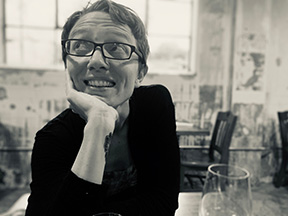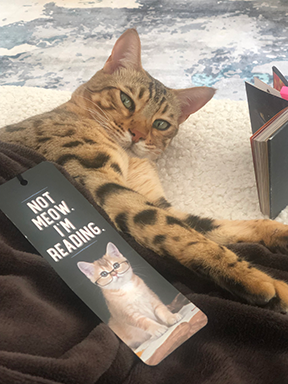Revisiting Amie Whittemore’s story from the Spring 2020 inspired in me a nostalgic pang–for a time when sequestering oneself was a choice–and a renewed appreciation for the piece itself. Amie packs a lot into 307 words. I think you’ll enjoy “Love Hermits” and my brief interview with Amie. [VV]
How did this story come to be?
This story originated with a challenge from my friend, the fiction writer Alexander Lumans. He was working on a 300-word flash story for an Electric Literature contest a couple years ago and I was in a writing rut, so I decided I would also try to write a 300-word story for the contest—which meant writing several 300-word stories! “Love Hermits” came out of that process (and, fun side note, the story I submitted to the contest, “The Five Love Languages Guide to Breaking Up,” was a finalist and eventually found publication elsewhere!). The moral of this story is: find a writer friend who will challenge you when you need a push.
Is there an aspect of fiction writing you find particularly challenging, i.e. getting started, story beginnings, middles, endings?
I find every aspect of fiction challenging. I think the hardest element for me is plot: I love plots, yet I find myself struggling to write them, which results in stories languishing on the backburner for years at a time. And yet I also am incapable of writing deeply lyrical stories driven by atmosphere, character, interiority. I do, in the end want things—often quiet, domestic things as in “Love Hermits”—to happen. Thus, I spend a lot of time being haunted by my characters and their unfinished stories. Often I require an outside impetus—a contest deadline, or a friend who is willing to read a finished piece—to overcome my fiction writing anxieties.
 What are you working on now?
What are you working on now?
Right now, I am extremely grateful to be at Oak Spring Garden Foundation (OSGF) for a writing residency and working on a poetry manuscript. I am still in the early stages of looking at the poems I’ve written over the last few years and seeing how they work together, but I feel fairly confident that this collection will center around some familiar obsessions for me: dreams, love, plants, animals, and climate grief.
Do you have any current or recent projects or publications you’d like to promote?
As part of my poet laureateship for the city of Murfreesboro, Tennessee, I’ve launched two projects I’d love to promote! The first is Dream Geographies, which is an arts collaborative that fosters collaborations between dreamers, poets, and visual artists (though it may evolve to include other genres). We ask for descriptions of dreams to share with poets and visual artists, who create poems/artwork inspired by the dreams for our online gallery. Our second round of poets and artists are at work creating our ‘second dream’ gallery, which will debut in December!
The second is Write with Pride, a series of workshops and open mics offered to LGBT+ youth in middle Tennessee. This project came to life thanks to the Academy of American Poets, which awarded me a 2020 Laureate Fellowship this year. Through this fellowship support, I am able to partner with local literary nonprofits and organizations, The Porch, Southern Word, and Poetry in the Boro, to foster spaces for LGBT+ youth to write about their experiences and connect with each other.
What is the last thing you read that impressed the heck out of you?
I adored Lydia Millet’s A Children’s Bible and read it in approximately 36 hours just last week. It’s beautiful, incisive, and strange, like all her work, in its exploration of spirituality/religion, climate grief, and how we connect to each other and the world.
***
Amie Whittemore is the author of the poetry collection Glass Harvest (Autumn House Press). Her poems have won multiple awards, including a Dorothy Sargent Rosenberg Prize, and her poems and prose have appeared in The Gettysburg Review, Nashville Review, Smartish Pace, Pleiades, and elsewhere. She is the reviews editor for Southern Indiana Review and teaches English at Middle Tennessee State University. Her website is http://www.amiewhittemore.com.






